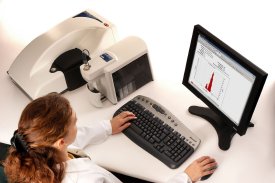Researchers at micromod Partikeltechnologie GmbH are using the Zetasizer Nano particle characterization system from Malvern Panalytical, equipped with an MPT-2 Autotitrator and degasser, to determine particle size and to measure the zeta potential of nanoparticles as a function of pH.
micromod Partikeltechnologie GmbH develops and produces functional nano- and micro-particles for biochemical applications, with magnetic nanoparticles being the key products. The Zetasizer Nano is used in all new and enhanced product development, to create formulations with the appropriate release criteria in terms of particle size and surface potential, and for the quality control of finished products. Particle size is an important criterion for product release in accordance with the company's strict quality standards, which include ISO 9001:2008, and EN ISO 13485:2003 / AC 2007.

Dr. Cordula Grüttner from micromod Partikeltechnologie explains: "We use the Zetasizer Nano to measure the size distributions of particles from 15 nm to 2 microns in diameter. In the course of chemical or biochemical surface modification of particles, it is also important for us to follow the colloidal stability of the systems by measuring the size distribution, and to prevent aggregation of particles by selecting appropriate conditions. We test the quality of the surface modifications - which may involve introducing functional groups or coating the particles with biomolecules such as proteins and antibodies - by measuring zeta potential as a function of pH using the Autotitrator. This measurement additionally helps us in the application-specific development and optimization of surface particles in cooperation with our customers."
" We produce particles of many different materials including silicates, dextran-iron oxide composites, polystyrene and poly-lactic acid, and all have different physical properties. The ability to measure rapidly with no cleaning between measurements was a key factor in the choice of system, as was the provision of disposable cuvettes."
"We very much value the customer service and training opportunities from Malvern Panalytical," concludes Cordula Grüttner, "In particular, the rapid diagnosis of any issues through direct internet connection with the Malvern Panalytical customer service team has prevented us from suffering production downtime."
Zetasizer Nano particle characterization systems from Malvern Panalytical measure particle size, zeta potential and molecular weight. Applications range from characterizing high concentration colloids and nanoparticles, through to measurement of dilute proteins and macromolecules in their native state, requiring as little as 12 microlitres of sample.